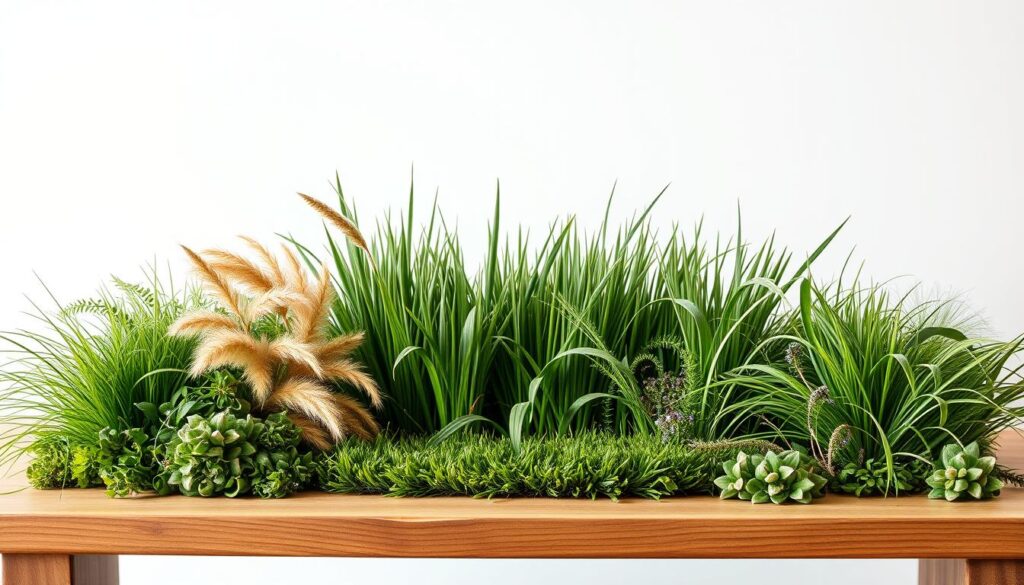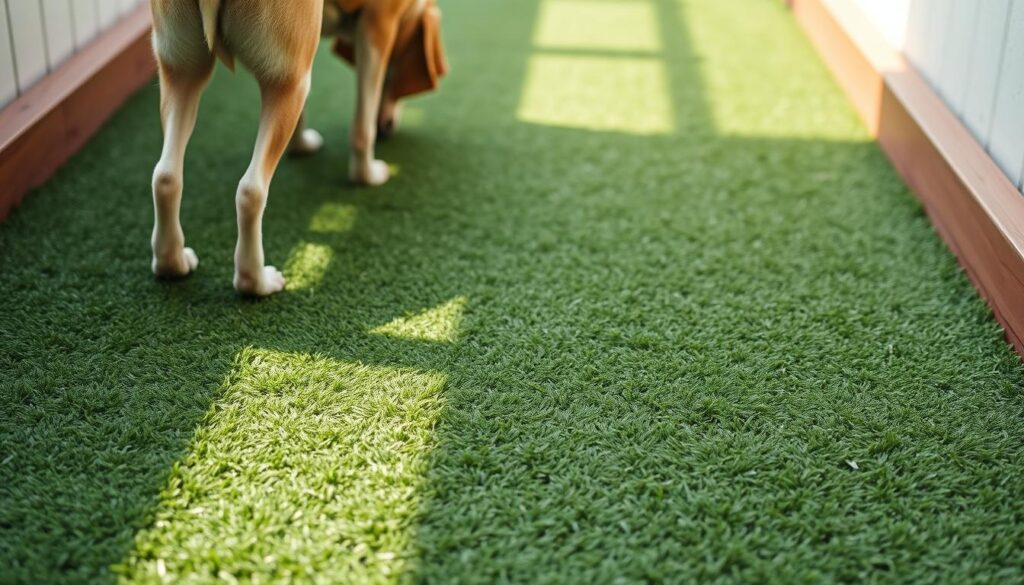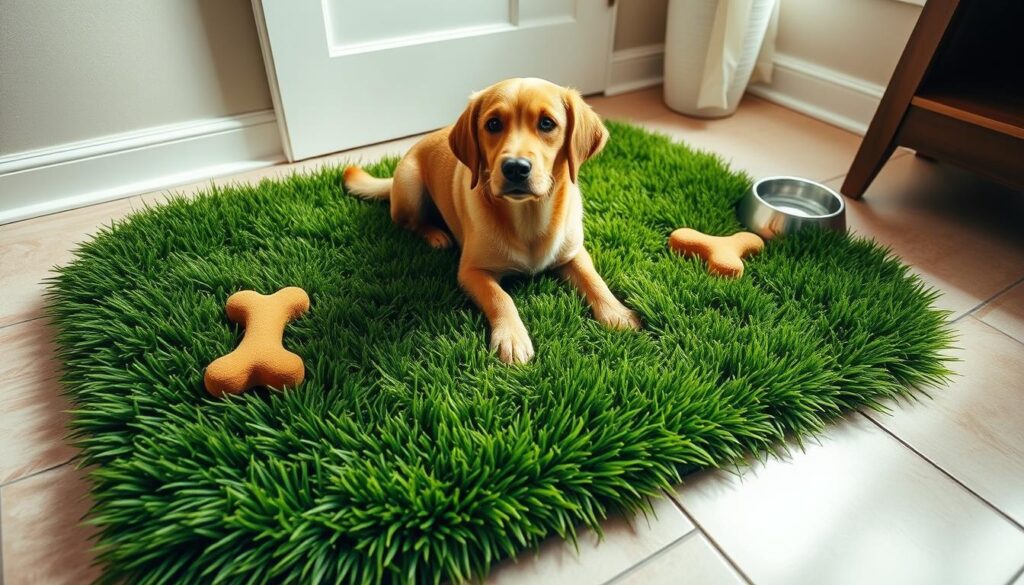Every dog owner faces the challenge of housetraining. Nights filled with cleaning up accidents and the worry about your dog’s bathroom habits are common. Is there an easier way to handle your dog’s indoor potty needs?
Dog potty grass has changed how we housetrain our pets. It offers a natural, comfy spot for your dog to go, perfect for those living in apartments or with little outdoor space.
If you’re new to dog ownership or finding traditional training hard, dog potty grass is a game-changer. It’s not just a tool; it’s a relief for pet parents looking for ease and effectiveness.
Key Takeaways
- Dog potty grass provides a natural solution for indoor bathroom needs
- Perfect for apartment living and dogs with limited outdoor access
- Reduces stress for both dogs and their owners during housetraining
- Mimics natural grass environment for comfortable pet relief
- Offers a convenient alternative to traditional housetraining methods
What is Dog Potty Grass?
Dog potty grass is a new way for pet owners to have an easy indoor bathroom for their dogs. It’s a smart choice instead of using the yard for potty training.
Indoor dog grass pads have changed how we care for pets. They work well in small spaces or where going outside is hard. This makes caring for your dog easier.
Understanding its Purpose
Dog potty grass is made to give your dog a comfy spot to go. It feels like real grass, which dogs find easy to use.
- Provides a consistent bathroom area
- Reduces indoor accidents
- Supports dogs with limited mobility
- Ideal for apartment dwellers
Types of Dog Potty Grass Available
Today, pet owners have many choices for artificial turf for dogs:
- Disposable Grass Pads: Single-use options with absorbent layers
- Reusable Synthetic Grass: Washable mats with drainage systems
- Hydroponic Living Grass: Real grass replacements with built-in trays
- Permanent Indoor Turf: Durable synthetic grass for long-term use
Each type of synthetic grass for dogs has its own benefits. This lets pet owners pick the best one for their home and dog’s needs.
Benefits of Using Dog Potty Grass
Pet potty training can be tough for dog owners. But, dog grass pads offer a new way to make it easier. These products bring many benefits that help with housetraining for pets and their owners.
Finding the right way to train your pet can change your home and your dog’s habits. Dog grass pads are a great choice for today’s pet owners. They offer several key benefits.
Provides a Convenient Solution
A dog grass pad is super convenient for pet owners who are always busy. It’s great for those living in apartments, working long hours, or having mobility issues. It gives your dog a reliable place to go to the bathroom indoors.
- Perfect for apartments and small living spaces
- Accessible during extreme weather conditions
- Ideal for dogs with limited outdoor mobility
Reduces Indoor Accidents
Dog grass pads make pet potty training much simpler. They have a natural grass texture that dogs find appealing. This helps create a specific bathroom area, cutting down on accidents inside.
- Mimics natural grass texture
- Encourages consistent bathroom behavior
- Protects floors and carpets from unexpected messes
Promotes Good Habits
Using a dog grass pad regularly helps teach your dog good bathroom habits. It sets up a structured environment for them to learn where to go.
Training tip: Reward your dog immediately after using the grass pad to reinforce positive bathroom habits.
How Dog Potty Grass Works
Dog potty grass is a smart choice for pet owners who want a convenient indoor bathroom for their pets. These special grass pads are made to feel like the outdoors. They offer great benefits for dogs and their owners.
Learning about dog pee pads can help you decide if they’re right for you. Let’s look at how these clever products work.
Natural Absorption Properties
Dog potty grass pads have special features that make them great for indoor use. They include:
- Specially treated grass material that quickly absorbs liquid
- Multi-layer design with moisture-locking technology
- Leak-proof backing to protect floors and surfaces
Odor Control Features
These dog restroom grass solutions also have advanced odor control. They usually have:
- Antimicrobial layers that reduce bacterial growth
- Natural enzymes that break down waste effectively
- Activated charcoal components for maximum odor elimination
Many providers offer direct-to-door delivery, often through subscription services. Fresh grass pads arrive in protective packaging. They’re ready to use right away, with no extra setup needed.
Pro Tip: Replace your dog pee pad regularly to maintain optimal hygiene and effectiveness.
Choosing the Right Dog Potty Grass
Choosing the right grass for your dog is important. It affects your dog’s comfort and your home’s cleanliness. The right grass can make housetraining easier for your pet.

- Size and dimensions that match your dog’s needs
- Material quality and durability
- Absorption capabilities
- Odor control features
- Ease of cleaning and maintenance
Essential Evaluation Criteria
The grass for dogs should meet certain standards. Not all dog toilet grass products are created equal. Look at these important points:
- Water retention and drainage efficiency
- Natural grass texture that attracts dogs
- Non-toxic materials safe for pets
- Compatibility with indoor and outdoor spaces
Balancing Quality and Price
High-quality dog toilet grass doesn’t have to be expensive. Look for good deals while keeping important features in mind. Cheap options might save money upfront but could cost more in the long run.
Pro tip: Read customer reviews and seek recommendations from veterinarians or professional dog trainers to make an informed decision.
Remember, the best dog toilet grass fits your home, dog’s size, and training needs. Take your time to find a product that keeps your pet comfortable and your home clean.
Setting Up Dog Potty Grass at Home
Creating the perfect indoor dog potty area needs careful planning and the right spot. Your indoor dog potty setup is key to successful house training and your dog’s comfort.
When you bring dog potty grass home, where you put it matters a lot. You should pick a spot that is:
- Easily accessible for your dog
- Away from food and sleeping areas
- On a surface that can be cleaned quickly
- Protected from high-traffic zones
Ideal Placement Strategies
Choose a spot that gives your dog privacy and is easy to get to. Bathrooms, laundry rooms, or quiet corners are great for indoor dog potty grass. Make sure it has good air flow and is close enough for your pet to get to fast.
Initial Training Techniques
Training your dog to use dog potty grass takes patience and positive rewards. Start by:
- Introducing your dog to the grass area often
- Rewarding them with treats when they use it
- Keeping a regular schedule
- Cleaning the area right after use
Pro tip: Place the dog potty grass in a consistent location to help your pet learn and adapt quickly.
Maintaining Dog Potty Grass
Keeping your artificial turf for dogs clean is key for pet potty training. Regular care keeps your home and pet healthy.

Essential Cleaning Routine
Keeping your dog’s potty area clean needs a steady routine. Follow these steps to keep the turf in great shape:
- Remove solid waste right away
- Rinse the turf with water every day
- Use enzymatic cleaners for deep cleaning
- Disinfect the area once a week
Effective Cleaning Solutions
Enzymatic cleaners are top-notch for fighting odors. They break down protein waste, killing bacteria and smells better than regular cleaners.
| Cleaning Method | Frequency | Benefits |
|---|---|---|
| Daily Rinse | Every 24 hours | Prevents bacteria buildup |
| Enzymatic Cleaning | 2-3 times per week | Neutralizes odors completely |
| Deep Disinfection | Weekly | Kills harmful bacteria |
Replacing and Refreshing Grass
Artificial turf for dogs doesn’t last forever. You’ll need to replace it every 6-12 months, based on use and care. Look for wear, odors, or color changes to know it’s time for a new one.
Pro tip: Always have a backup artificial turf ready to ensure uninterrupted pet potty training.
Dog Potty Grass for Apartments
Urban pet owners face unique challenges when it comes to dog bathroom solutions. Synthetic grass for dogs has become a game-changing option for apartment dwellers. It offers convenient potty training methods for their furry companions.
Living in a compact space doesn’t mean you have to compromise on your dog’s bathroom needs. A dog grass pad offers an innovative solution. It makes indoor potty training a stress-free experience.
Space-Saving Solutions for Urban Pet Owners
Apartment living requires smart, compact solutions for pet care. Here are key advantages of synthetic grass for dogs in small spaces:
- Minimal floor space requirement
- Easy to clean and maintain
- Portable and lightweight design
- Mimics natural grass texture
Indoor Bathrooms for Small Dogs
Small dogs particularly benefit from specialized indoor potty solutions. A well-designed dog grass pad can make a significant difference in your apartment training routine.
| Dog Size | Recommended Grass Pad Size | Best Placement |
|---|---|---|
| Toy Breeds | Small (16″ x 24″) | Bathroom or Balcony |
| Small Breeds | Medium (24″ x 36″) | Utility Room |
When selecting a dog grass pad for your apartment, consider your dog’s size, frequency of use, and available space. Measure your area carefully to ensure a perfect fit. This will help it integrate seamlessly into your living environment.
Common Mistakes to Avoid
Training your dog to use a dog toilet grass can be tough. Many pet owners make big mistakes that slow down the training. These mistakes can upset both the dog and the owner.
To use a dog pee pad or grass well, you need to pay close attention and be consistent. Knowing what mistakes to avoid can help you train better.
Misplacement of Dog Toilet Grass
Choosing the right spot for your dog’s potty area is very important. Here are some common mistakes to avoid:
- Placing the dog pee pad in busy areas
- Choosing spots far from where your dog lives
- Changing the potty area too often
- Putting it near where your dog eats and drinks
Neglecting Training Reinforcement
Consistent training is key to using dog toilet grass well. Pet owners often make these mistakes:
- Punishing accidents instead of guiding
- Not being consistent with positive feedback
- Expecting your dog to be perfect right away
- Not watching over your dog during the early stages
Remember, patience and positive feedback are your best tools in dog potty training. Every dog learns in their own way. So, adjust your training to fit your dog’s unique needs and how they learn.
“Training takes time. Stay consistent and your dog will learn,” recommends professional dog trainer Sarah Martinez.
By avoiding these common mistakes, you’ll make potty training with your dog toilet grass easier and more effective.
Final Thoughts on Dog Potty Grass
Choosing the right dog restroom grass can change your housetraining journey. Your pet’s happiness and your home’s cleanliness depend on it. You need to pick wisely, considering your lifestyle and your dog’s needs.
When picking a grass for dogs, think about your living space, your pet’s size, and training needs. If you live in the city and have little outdoor space, these solutions are great. The goal is to find a balance between indoor ease and keeping your dog’s natural habits.
Making the Best Choice for Your Dog
Dr. Hansen, a vet, says indoor potty solutions are handy but not a full replacement for outdoor time. A dog restroom grass can help with training, but don’t forget to give your pet outdoor experiences too.
A Stress-Free Housetraining Experience
Investing in quality training and the right grass for dogs makes housetraining easier and less stressful for everyone. Patience, consistency, and knowing your dog’s needs are key to successful housetraining.
FAQ
What is dog potty grass?
Dog potty grass is a special indoor spot for dogs to go to the bathroom. It can be real grass or fake turf. It’s great for people living in apartments or those who don’t have a yard.
How often should I replace the dog potty grass?
You’ll need to change the grass every 1-2 weeks, depending on how much your dog uses it. Fake grass lasts longer, needing a full change every 3-6 months if you clean it regularly.
Can dog potty grass help with house training?
Yes, it can. Dog potty grass gives dogs a place to go that feels like outside. This helps them learn where to go to the bathroom and cuts down on accidents inside.
Is dog potty grass suitable for all dog breeds and sizes?
Yes, it is. There are different sizes and types of dog potty grass for all kinds of dogs. You can find small pads for small dogs or bigger systems for larger dogs.
How do I clean and maintain dog potty grass?
For real grass, take out solid waste right away and rinse it often. Fake grass needs enzymatic cleaners and a weekly thorough cleaning. Always follow the maker’s cleaning tips.
Are there odor control features with dog potty grass?
Most dog potty grass has features to control smells. Real grass can absorb odors, and fake grass often has special treatments and drainage to keep smells down.
Can dog potty grass be used in apartments?
Absolutely! It’s perfect for apartments because it gives dogs a place to go to the bathroom without needing to go outside. Look for designs that save space.
What’s the difference between natural and synthetic dog potty grass?
Natural grass feels more like real grass but needs to be replaced often. Fake grass is more durable, easier to keep clean, and works well for a long time.
How do I train my dog to use potty grass?
Start by putting your dog on the grass after meals, naps, and play. Use treats and praise when they use it correctly. Be patient and consistent.
Are there any potential drawbacks to using dog potty grass?
Some downsides are the ongoing cost, regular upkeep, and dogs might rely too much on it. Make sure to also take them outside for walks and training.
There are no reviews yet. Be the first one to write one.

